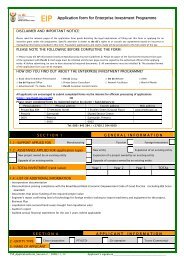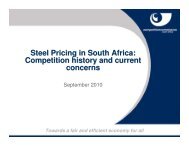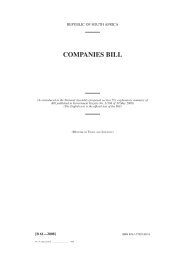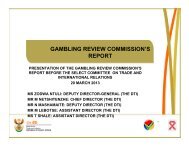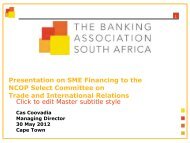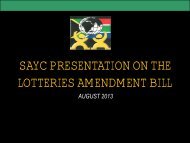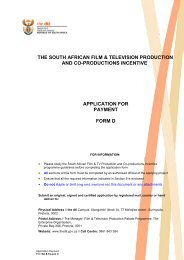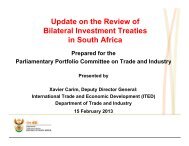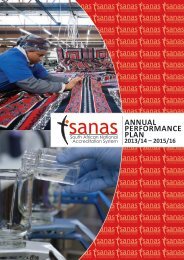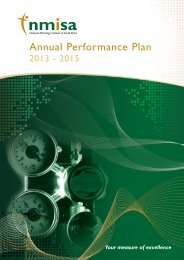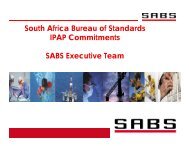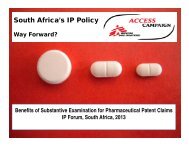Copyright Review Commission Report - ICT Law and Regulation ...
Copyright Review Commission Report - ICT Law and Regulation ...
Copyright Review Commission Report - ICT Law and Regulation ...
- No tags were found...
Create successful ePaper yourself
Turn your PDF publications into a flip-book with our unique Google optimized e-Paper software.
subject to the payment of a royalty as provided for in Section 9A of the <strong>Copyright</strong> Act, 1978, <strong>and</strong> Section 5 (1) (b) of thePerformers' Protection Act, 1967. (‘Escrow’ is an American expression used to describe a deposit or fund held in trust.)3.1.23. Sub-regulation (6) provides that a collecting society may, pending a referral to the <strong>Copyright</strong> Tribunal or anarbitration, apply to the Tribunal or “the designated body in accordance with the provisions of the Arbitration Act”for a ruling requiring any potential user or user group to pay into an escrow account the amount dem<strong>and</strong>ed bythe collecting society <strong>and</strong> to furnish the information required for the later distribution of the funds once theapplicable tariff has been determined by the Tribunal or arbitrator.3.2 EVENTS FOLLOWING THE ENACTMENT OF NEEDLETIME LEGISLATION3.2.1. After the enactment of needletime legislation, the Record Industry of South Africa (RiSA), a trade associationwhose members own or control through exclusive licences an estimated 95% of the commercially releasedsound recordings currently broadcast by licensed South African commercial stations, established the SouthAfrican Music Performing Rights Association (SAMPRA). SAMPRA was accredited as a collecting society underthe Collecting Society <strong>Regulation</strong>s to administer on RiSA's behalf the rights of its members to receive royaltiesunder Section 9A of the <strong>Copyright</strong> Act.3.2.2. SAMPRA set about identifying different types of usage <strong>and</strong> creating tariffs. Thereafter it licensed about 3 500different licensees to whom several of the tariffs applied <strong>and</strong> who agreed to pay royalties based thereon inexchange for the right to enable their customers <strong>and</strong> other members of the public on their premises to listen tosound recordings, whether being played directly or on a radio station. By the end of 2010, approximatelyR94 million had been collected from the licensees <strong>and</strong> about R6 million in interest earned on the moneycollected. In the first half of 2011, a further R25 million was collected. This means that after operating costs arededucted, more than R100 million is available for distribution. (As will appear from what is said below, about halfof that is yet to be distributed to performers.)SAMPRA submitted its first distribution account to the Registrar of <strong>Copyright</strong> for his approval under theregulations. But he refused to approve the plan, inter alia, because it did not provide for the royalties collected inthe case of each sound recording to be shared equally between the copyright owner <strong>and</strong> the performer, in theabsence of any agreement entered into between them. SAMPRA replied that the Registrar's approach was notin accordance with the provisions of the <strong>Copyright</strong> Act <strong>and</strong> the Performers' Protection Act. It stated that whenthe proposed needletime legislation was being considered, RiSA <strong>and</strong> the representatives of the performersagreed that the legislation should provide for the equal distribution of needletime royalties between the owner ofthe copyright recording <strong>and</strong> the performer whose performance was embodied in the recording. However, thisproposal was not adopted by the legislature, which instead enacted that the shares of the copyright owner <strong>and</strong>the performer were to be determined between themselves by agreement or, failing such agreement, by the<strong>Copyright</strong> Tribunal or an arbitrator.3.2.3. SAMPRA thereafter instituted review proceedings against the Registrar in the North Gauteng High Court,seeking, inter alia, orders setting aside the Registrar's refusal to approve the distribution plan <strong>and</strong> ordering himto approve it. The Minister of Trade <strong>and</strong> Industry was joined as second respondent. SAMRO, which has beenaccredited under the regulations as a collecting society in respect of performers <strong>and</strong> is involved in theproceedings as the third respondent, has also opposed the relief sought. The other accredited collecting- 19 -



